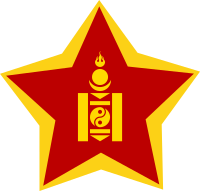More languages
More actions
mNo edit summary Tag: Visual edit |
(Publications) Tag: Visual edit |
||
| (2 intermediate revisions by the same user not shown) | |||
| Line 1: | Line 1: | ||
{{Infobox political party|name=Mongolian People's Army|native_name=Монголын Ардын Арми|logo=Emblem of Mongolian People's Army.svg|founded=1921 March|logo_size=200|dissolved=1992 February}} | {{Infobox political party|name=Mongolian People's Army|native_name=Монголын Ардын Арми|logo=Emblem of Mongolian People's Army.svg|founded=1921 March 18|logo_size=200|dissolved=1992 February}} | ||
The '''Mongolian People's Army''' ('''MPA'''), originally known as the '''Mongolian People's Revolutionary Army''' ('''MPRA'''), was the military of the [[Mongolian People's Republic (1924–1992)|Mongolian People's Republic]]. | The '''Mongolian People's Army''' ('''MPA'''), originally known as the '''Mongolian People's Revolutionary Army''' ('''MPRA'''), was the military of the [[Mongolian People's Republic (1924–1992)|Mongolian People's Republic]]. | ||
== Founding == | == Founding == | ||
After returning to [[Bogd Khanate of Mongolia (1911–1924)|Mongolia]] from Irkutsk, [[Damdin Sükhbaatar|Sükhbaatar]] organized 50 border Mongolian troops into a partisan detachment led by [[B. Puntsag]]. The First Party Congress of the [[Mongolian People's Party|MPRP]] in 1921 combined all the partisan soldiers into the People's Revolutionary Army, with Sükhbaatar as its commander-in-chief and [[Khorloogiin Choibalsan|Choibalsan]] as commissar.<ref name=":03">{{Citation|author=A. A. Guber, et al.|year=1973|title=History of the Mongolian People's Republic|title-url=https://archive.org/details/HistoryOfTheMPR/page/n116/mode/1up|chapter=The Mongolian People's Revolution and the Proclamation of the Mongolian People's Republic|page= | After returning to [[Bogd Khanate of Mongolia (1911–1924)|Mongolia]] from Irkutsk, [[Damdin Sükhbaatar|Sükhbaatar]] organized 50 border Mongolian troops into a partisan detachment led by [[B. Puntsag]]. The First Party Congress of the [[Mongolian People's Party|MPRP]] in 1921 combined all the partisan soldiers into the People's Revolutionary Army, with Sükhbaatar as its commander-in-chief and [[Khorloogiin Choibalsan|Choibalsan]] as commissar.<ref name=":03">{{Citation|author=A. A. Guber, et al.|year=1973|title=History of the Mongolian People's Republic|title-url=https://archive.org/details/HistoryOfTheMPR/page/n116/mode/1up|chapter=The Mongolian People's Revolution and the Proclamation of the Mongolian People's Republic|page=}}</ref><sup>:288–90</sup> | ||
== Revolution == | |||
On 1921 March 13, a congress of workers and partisans in Hiagt elected Sükhbaatar as Minister of War for the Provisional People's Government.<ref name=":03" /><sup>:293</sup> | |||
On March 16, the Central Committee and Provisional People's Government sent a message to the 10,000 Chinese soldiers in Maimachen telling them to surrender. They did not respond, and the People's Army attacked two days later and defeated them, expelling the warlords from the country.<ref name=":03" /><sup>:293–4</sup> | |||
On May 20, Ungern's forces advanced toward Hiagt and Altanbulag, the headquarters of the revolution. With the support of the [[Workers' and Peasants' Red Army|Soviet Red Army]], the People's Army defeated them and captured Ungern's commander [[Bayargun]]. The People's Revolutionary Army began marching toward Örgöö on June 27 and liberated it on July 8.On July 16, a permanent government formed with Sükhbaatar as Commander-in-Chief and Minister of War.<ref name=":03" /><sup>:297–300</sup> | |||
== Post-revolution == | |||
The 1924 Mongolian constitution introduced universal military training.<ref name=":03" /><sup>:318</sup> | |||
=== Second World War === | |||
Due to [[Empire of Japan (1868–1947)|Japanese]] expansion in the 1930s, the military budget increased from 34.7% of the state budget in 1934 to 52.5% in 1938, and the term of military service increased from two to three years.<ref name=":032">{{Citation|author=A. A. Guber, et al.|year=1973|title=History of the Mongolian People's Republic|title-url=https://archive.org/details/HistoryOfTheMPR/page/n160/mode/1up|chapter=The Mongolian People in the Fight for Development on Non-Capitalist Lines|page=}}</ref><sup>:344–5</sup> | |||
== Publications == | |||
The MPA published the newspapers ''Ardyn Tsereg'' ('People's Warrior') from 1924 to 1927, ''Cultural Path of the Revolutionary Red Army'' from 1927 to 1930, and ''Ulaan Od'' ('Red Star') after 1930.<ref name=":0322">{{Citation|author=A. A. Guber, et al.|year=1973|title=History of the Mongolian People's Republic|title-url=https://archive.org/details/HistoryOfTheMPR/page/n228/mode/1up|chapter=Cultural Construction in the MPR|page=465}}</ref> | |||
== References == | == References == | ||
Latest revision as of 18:59, 1 July 2024
Mongolian People's Army Монголын Ардын Арми | |
|---|---|
 | |
| Founded | 1921 March 18 |
| Dissolved | 1992 February |
The Mongolian People's Army (MPA), originally known as the Mongolian People's Revolutionary Army (MPRA), was the military of the Mongolian People's Republic.
Founding[edit | edit source]
After returning to Mongolia from Irkutsk, Sükhbaatar organized 50 border Mongolian troops into a partisan detachment led by B. Puntsag. The First Party Congress of the MPRP in 1921 combined all the partisan soldiers into the People's Revolutionary Army, with Sükhbaatar as its commander-in-chief and Choibalsan as commissar.[1]:288–90
Revolution[edit | edit source]
On 1921 March 13, a congress of workers and partisans in Hiagt elected Sükhbaatar as Minister of War for the Provisional People's Government.[1]:293
On March 16, the Central Committee and Provisional People's Government sent a message to the 10,000 Chinese soldiers in Maimachen telling them to surrender. They did not respond, and the People's Army attacked two days later and defeated them, expelling the warlords from the country.[1]:293–4
On May 20, Ungern's forces advanced toward Hiagt and Altanbulag, the headquarters of the revolution. With the support of the Soviet Red Army, the People's Army defeated them and captured Ungern's commander Bayargun. The People's Revolutionary Army began marching toward Örgöö on June 27 and liberated it on July 8.On July 16, a permanent government formed with Sükhbaatar as Commander-in-Chief and Minister of War.[1]:297–300
Post-revolution[edit | edit source]
The 1924 Mongolian constitution introduced universal military training.[1]:318
Second World War[edit | edit source]
Due to Japanese expansion in the 1930s, the military budget increased from 34.7% of the state budget in 1934 to 52.5% in 1938, and the term of military service increased from two to three years.[2]:344–5
Publications[edit | edit source]
The MPA published the newspapers Ardyn Tsereg ('People's Warrior') from 1924 to 1927, Cultural Path of the Revolutionary Red Army from 1927 to 1930, and Ulaan Od ('Red Star') after 1930.[3]
References[edit | edit source]
- ↑ 1.0 1.1 1.2 1.3 1.4 A. A. Guber, et al. (1973). History of the Mongolian People's Republic: 'The Mongolian People's Revolution and the Proclamation of the Mongolian People's Republic'.
- ↑ A. A. Guber, et al. (1973). History of the Mongolian People's Republic: 'The Mongolian People in the Fight for Development on Non-Capitalist Lines'.
- ↑ A. A. Guber, et al. (1973). History of the Mongolian People's Republic: 'Cultural Construction in the MPR' (p. 465).
